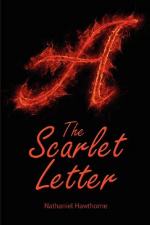Pearl was decked out with airy gaiety. It would have been impossible to guess that this bright and sunny apparition owed its existence to the shape of gloomy gray; or that a fancy, at once so gorgeous and so delicate as must have been requisite to contrive the child’s apparel, was the same that had achieved a task perhaps more difficult, in imparting so distinct a peculiarity to Hester’s simple robe. The dress, so proper was it to little Pearl, seemed an effluence, or inevitable development and outward manifestation of her character, no more to be separated from her than the many-hued brilliancy from a butterfly’s wing, or the painted glory from the leaf of a bright flower. As with these, so with the child; her garb was all of one idea with her nature. On this eventful day, moreover, there was a certain singular inquietude and excitement in her mood, resembling nothing so much as the shimmer of a diamond, that sparkles and flashes with the varied throbbings of the breast on which it is displayed. Children have always a sympathy in the agitations of those connected with them: always, especially, a sense of any trouble or impending revolution, of whatever kind, in domestic circumstances; and therefore Pearl, who was the gem on her mother’s unquiet bosom, betrayed, by the very dance of her spirits, the emotions which none could detect in the marble passiveness of Hester’s brow.
This effervescence made her flit with a bird-like movement, rather than walk by her mother’s side.
She broke continually into shouts of a wild, inarticulate, and sometimes piercing music. When they reached the market-place, she became still more restless, on perceiving the stir and bustle that enlivened the spot; for it was usually more like the broad and lonesome green before a village meeting-house, than the centre of a town’s business.
“Why, what is this, mother?” cried she. “Wherefore have all the people left their work to-day? Is it a play-day for the whole world? See, there is the blacksmith! He has washed his sooty face, and put on his Sabbath-day clothes, and looks as if he would gladly be merry, if any kind body would only teach him how! And there is Master Brackett, the old jailer, nodding and smiling at me. Why does he do so, mother?”
“He remembers thee a little babe, my child,” answered Hester.
“He should not nod and smile at me, for all that—the black, grim, ugly-eyed old man!” said Pearl. “He may nod at thee, if he will; for thou art clad in gray, and wearest the scarlet letter. But see, mother, how many faces of strange people, and Indians among them, and sailors! What have they all come to do, here in the market-place?”




